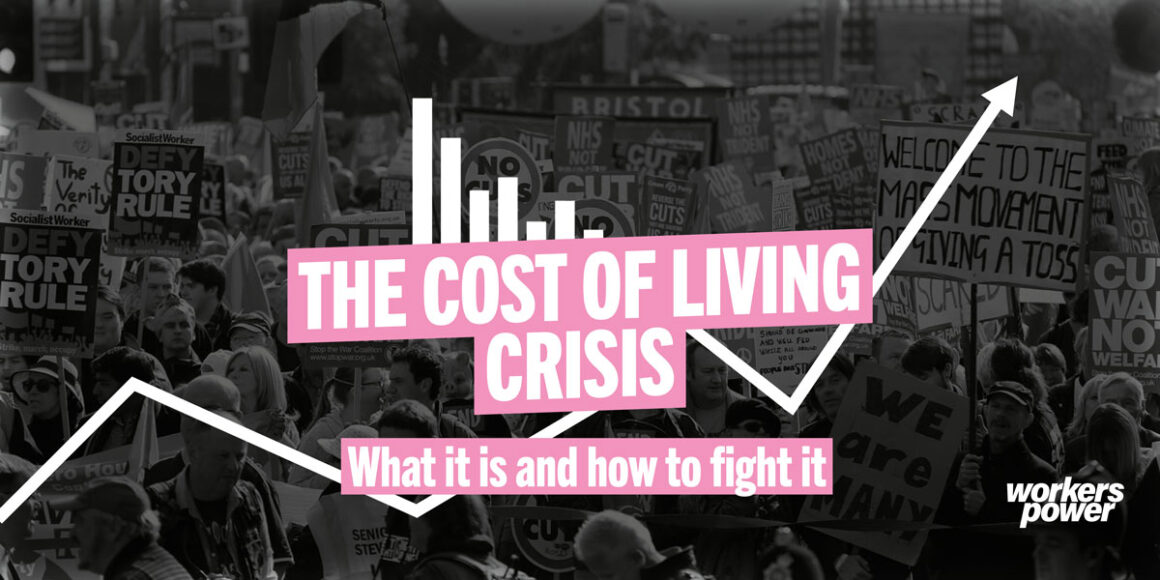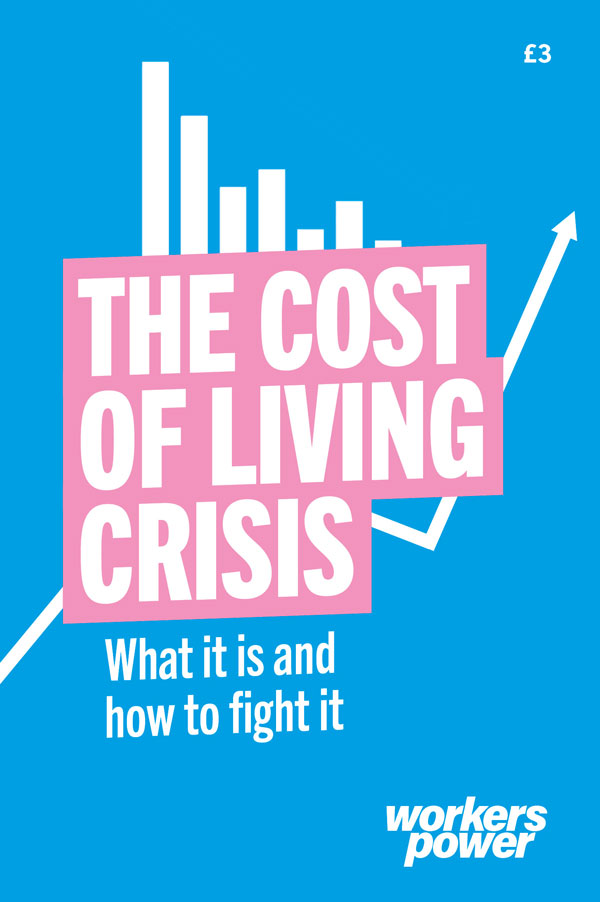

WORKERS IN BRITAIN today face the biggest cost of living squeeze for two generations. The Retail Price Index (RPI) rate of inflation stands at its highest since 1980 at 13%. But that doesn’t even come close to explaining the impact on working class households — energy, transport, housing and food costs are rising even faster.
The Bank of England has started to raise interest rates to protect the financial sector, making the working class pay the price of inflation by slowing the economy, increasing unemployment and likely triggering a recession. City forecasters are warning Britain could slip into a recession as early as the summer, as prices rise and production falls. Britain recorded two consecutive months of negative growth in March and April. The OECD predicts the British economy will not grow at all in 2023, the lowest in the top 20 economies — except sanctions-hit Russia!
So as well as the sickness of inflation, the ‘cure’ will be twice as bad. If inflation gives way to deflation the results will be the same — the working class will pay for restoring profits through unemployment. For the rich and bankers, a recession is a smaller price to pay than inflation, which erodes the value of their investments and loans they’ve made to house-buyers, consumers, businesses, and governments. We need a solution that deflates their profits and redistributes their huge accumulated wealth towards our wages, homes, public services and the environment.

Our new pamphlet analyses the cost of living crisis and outlines a programme of working class action to defend jobs, pay and public services. Get your copy for £3
Behind the numbers, the reality for millions of working class people and their families, this crisis is causing real suffering. Children are going to bed hungry and cold. Pensioners are afraid to put the heating on or make a proper meal. Mothers lose weight because they can only afford to feed their children not themselves. Families face eviction because they cannot keep up with rising rents.
But society, taken as a while, has not suddenly got poorer. Company profits and executive pay have gone up. The billionaires are richer than ever before. In other words the money is there. We just have to find out how we can take it and share it equitably among the most in need.
That’s what socialism means at the most basic level. And that is the task facing the labour and social movements today
Heating or eating?
The government raised the energy price cap from 1 April, adding another £700 to the average household’s bills. It is set to rise again in October to around £2,800: a 227% increase year-on-year. Many more pensioners and working families will have to choose between eating and heating next winter.
According to End Fuel Poverty more than one in four UK households will be in fuel poverty. The Resolution Foundation estimates that 1.3 million people in the UK will be pushed into ‘absolute poverty’ this year.
On the other hand, BP and Shell made profits, in the first three months of 2022 alone, of $9.1bn and $6.2bn respectively. And there’s no sign of the inward flow of cash stemming any time soon.
As well as oil and gas, the Russian invasion of Ukraine has also caused food prices to jump further. The two countries account for 30% of the world’s wheat exports. The price of bread and pasta has increased by up to 50%. In 2021 a record 2.5 million people depended on food banks, institutions which barely existed a decade ago. Imagine the clamour when food prices go through the roof.
The war has also resulted in unprecedented sanctions being levied against Russia by Nato countries. These measures of economic warfare, which have driven oil prices up around the globe, could well prove to be almost as damaging to the UK and other countries as they are already proving to Russia.
Rising inflation, the lifting of the cap on energy bills, increases in rents and mortgage payments, continuing sanctions and war in Ukraine — not to mention tax hikes — will accelerate the biggest fall in living standards since the Second World War.
Faced with this the first response of the government — and behind them the employers — is to urge ‘restraint’ over pay as workers try to compensate for rising prices, as if higher pay was causing inflation. In fact what they mean is that workers’ living standards must be sacrificed to protect profits.
With supply chains (particularly for food and energy) broken by Brexit, disrupted by Covid and ruptured by war and sanctions, this inflation crisis is not ‘transitory’ but will continue right through 2023.
Meanwhile, basic pay has ‘risen’ by an average 4.2% — and just 1.6% for public sector workers. As a result, consumer spending is falling every month at the steepest rate since records began in the 1950s.
The effect on British workers is twofold. First, we are experiencing a cost of living crisis which is pushing millions into poverty. Second, the drop in spending and economic slowdown will mean more austerity and job cuts.
The general economic crisis has its long-term basis in 40 years of falling wages, exacerbated by the Great Recession of 2008–11. Coupled with this have been the devastating effects of 12 years of Tory misrule, most visible in the decline, privatisation and disappearance of public services, and the economic self-mutilation of Brexit.
Tories’ steal Labour’s clothes again
Chancellor Rishi Sunak’s response to all this has been lacklustre to say the least. His Spring Statement signalled the return of austerity despite the steepest slide in living standards since records began.
Tory backbenchers roared their approval and waved glossy brochures with ‘Tax plan’ emblazoned on them when Sunak announced a series of supposed tax cuts. But even the Office for Budget Responsibility pointed out that these amounted to one-sixth of Sunak’s tax rises since becoming chancellor.
The 1.25% increase in National Insurance contributions remains in place. Six pence off the price of petrol sounds nice, but filling a family car costs over £100, a third higher than a year ago. The real value of benefits and pensions will continue to fall.
In a desperate effort to distract people’s attention from Partygate, Sunak finally unveiled a package of measures to help those hit hard by the cost of living crisis. He has stolen Keir Starmer’s top policy: a windfall tax on energy profits. He also announced an additional £15bn support package which includes: a one-off £650 payment to households on benefits and pensioners plus a few hundred pounds here and there.
In addition, there will be £400 to help with the energy bills when the cap is raised to £2,800. The ‘energy bill discount’ still leaves most households down by over £1,000 a year. British households will spend a collective £19bn on energy costs this year. And that’s just on gas and electricity! Thanks for the £5bn Rishi — where’s the rest?
As for the penny-pinching bosses, there was something in the small print for them. An ‘80% investment allowance’ will double the amount of tax relief companies get on any profits they reinvest, saving them 91p in tax for every £1 they invest. They’re not shouting about it, but they’re laughing all the way to the bank (or tax haven).
Against this Tory shell game, moving piles of money around to produce the illusion of taxing the rich, the whole energy sector should be nationalised and run under workers’ and consumers’ control, with its profits used to neutralise inflation and massively invest in the transition to green energy.
The announcement sparked criticism from reactionary quarters, including the bosses’ union, the CBI, with one MP, Richard Drax, accusing the Chancellor of ‘throwing red meat to socialists’.
As for everything else, forget it. The NHS? Never mentioned, no new money despite the £12bn levy squeezed out of our pay packets. Children after Covid? No expansion of free school meals, no more money for schools, only more academies. Pay? Nothing: nurses will face a £1,600 drop in their real income this year (clap, clap). Jobs? The Tories aim to chop 90,000 civil service posts. And food? Johnson humbly advises that we should increase our consumption of ‘responsibly resourced wild venison’.
But the biggest suckers were Starmer & Co. whose headline anti-inflation policies, meagre as they were, have been stolen by the Tories yet again. They lamely argue for VAT to be suspended (it should be abolished!) and some money for home insulation — as if we can afford that when there’s kids to feed.
The Blairite policy of triangulation — pitching a bit to the left of the Tories to win middle class voters, while banking on the working class having no choice but to vote Labour — is in tatters. Its grossly inadequate measures have been trumped by the Tories smash and grab. In reality, whether Starmer’s policies or Sunak’s manoeuvres win out, we are told to tighten our belts.
Topple the Tories
The ruling class accumulates its enormous hoard of wealth on the backs of the working class, while avoiding taxes on their ill-gotten gains to fund the few remaining public services. The money is there, in the City of London and their offshore havens, many times over to pay for this crisis.
We can and must resist the rising cost of living. The TUC should announce a mid-week demonstration, encouraging strike action, against the October energy price cap rise. Mass non-payment is an option — if organised. We must link this to the new wave of pay strikes, which are running at their highest level for five years, uniting the organised labour movement with the wider working class.
The past 15 years have seen a relentless onslaught against the working class and the oppressed. Governments have demonised migrants and asylum seekers, scapegoated the unemployed and undermined living standards of disabled people.
They have empowered the unaccountable, racist and sexist police and restricted the right to protest. The NHS has been chronically underfunded and increasingly privatised, while council budgets have been slashed to the bone. Austerity is back in the form of job losses, pay restraint and service cuts.
Meanwhile rights at work are under attack as the Tories denounce ‘disruptive’ strikes. Our pensions and pay have all been eroded while food banks have boomed and the gig economy flourished.
An explosive movement that arises in response to the cost of living crisis has the potential not just to claw back what we have lost, but to fight for so much more — and topple this rotten Tory government.
That is the message of this pamphlet. If you agree with what we say — join us!

Our new pamphlet analyses the cost of living crisis and outlines a programme of working class action to defend jobs, pay and public services. Get your copy for £3